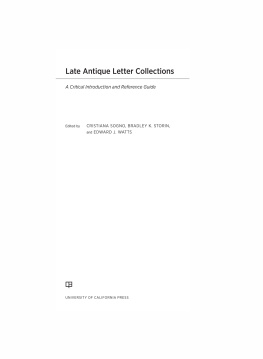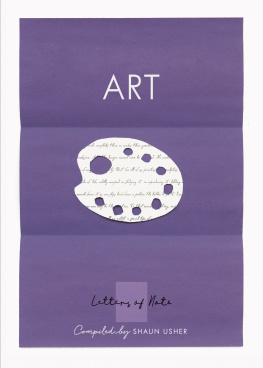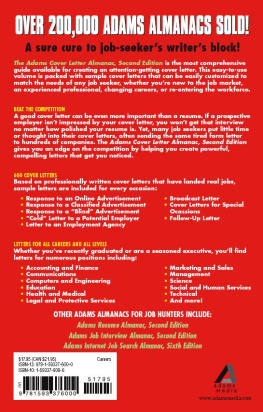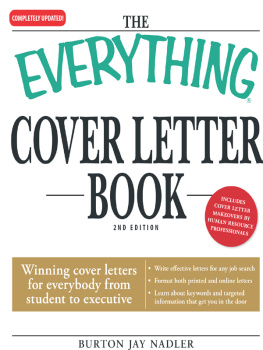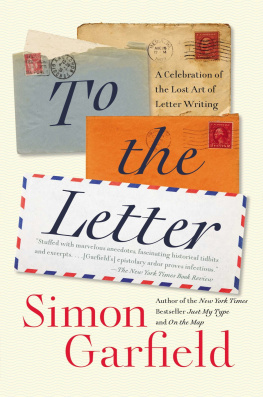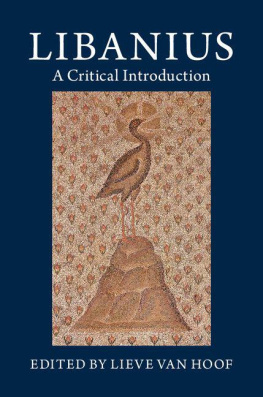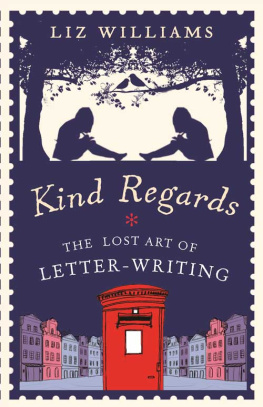O degli altri poeti onore e lume...
The publisher gratefully acknowledges the generous support of the Classical Literature Endowment Fund of the University of California Press Foundation, which was established by a major gift from Joan Palevsky.
Late Antique Letter Collections
A Critical Introduction and Reference Guide
Edited by
CRISTIANA SOGNO, BRADLEY K. STORIN, and EDWARD J. WATTS

UNIVERSITY OF CALIFORNIA PRESS
University of California Press, one of the most distinguished university presses in the United States, enriches lives around the world by advancing scholarship in the humanities, social sciences, and natural sciences. Its activities are supported by the UC Press Foundation and by philanthropic contributions from individuals and institutions. For more information, visit www.ucpress.edu.
University of California Press
Oakland, California
2017 by The Regents of the University of California
Library of Congress Cataloging-in-Publication Data
Names: Sogno, Cristiana, 1969. | Storin, Bradley K., editor. | Watts, Edward Jay, editor.
Title: Late antique letter collections : a critical introduction and reference guide / edited by Cristiana Sogno, Bradley K. Storin, and Edward J. Watts.
Description: Oakland, California : University of California Press, [2016]. | Includes bibliographical references and index.
Identifiers: LCCN 2016014718 | ISBN 9780520281448 (cloth : alk. paper) | eISBN 978-0-520-96619-2 (eBooks)
Subjects: LCSH : Classical lettersHistory and criticism. | Letter writing, Classical. | Civilization, Classical, in literature.
Classification: LCC PA 3042 . L 38 2016 | DDC 880.09dc23
LC record available at https://lccn.loc.gov/2016014718.
Manufactured in the United States of America
24 23 22 21 20 19 18 17 16 15
10 9 8 7 6 5 4 3 2 1
CONTENTS
Cristiana Sogno, Bradley K. Storin, and Edward J. Watts
Michele Renee Salzman
Christopher P. Jones
Susanna Elm
Andrew Radde-Gallwitz
Bradley K. Storin
Andrew Radde-Gallwitz
Lieve Van Hoof
Charles N. Aull
Grard Nauroy
Robin Darling Young
Cristiana Sogno
Daniel Washburn
David Maldonado Rivera
Andrew Cain
Jennifer V. Ebbeler
Dennis Trout
Adam M. Schor
Lillian I. Larsen
Sigrid Mratschek
Ralph W. Mathisen
Brendan McCarthy
Stefanie A.H. Kennell
Edward J. Watts
David Westberg
Jennifer L. Hevelone-Harper
Shane Bjornlie
Bronwen Neil
ACKNOWLEDGMENTS
We owe many debts in bringing such a large project to fruition, and it is a pleasure to have the opportunity to thank all the people who have helped us along the way. Eric Schmidt at UC Press has been an invaluable ally; his support and involvement at every stage have ensured its timely completion. The Department of History at the University of California, San Diego funded and provided the venue for a conference that brought the editors and many of the contributors together in January 2014. Thanks to Jamie Gonzalezs excellent oversight of the event, the project gained both the shape and momentum it would need to keep going for the next several years. The anonymous readers for UC Press offered pointed comments and thoughtful criticism that helped us refine the project. A grant from Fordham University covered the costs of copy editing. We owe special gratitude to Diane S. Fruchtman, who read through, edited, and standardized the entire manuscript, and Jonathan Martin, who made the index. Cindy Fulton, Marian Rogers, and the rest of the editorial team at UC Press shepherded us through the final stages of publication with cheerful efficiency and impeccable professionalism. Last, but certainly not least, we want to thank our contributors; their enthusiastic adherence and dedication have made this volume a reality.
ABBREVIATIONS
ACO | Acta Conciliorum Oecumenicorum |
AJP | American Journal of Philology |
AnTard | Antiquit Tardive |
CA | Classical Antiquity |
CCSG | Corpus Christianorum: Series Graeca |
CCSL | Corpus Christianorum: Series Latina |
CP | Classical Philology |
CPG | Clavis Patrum Graecorum |
CPL | Clavis Patrum Latinorum |
CQ | The Classical Quarterly |
CSCO | Corpus Scriptorum Christianorum Oreintalium |
CSEL | Corpus Scriptorum Ecclesiasticorum Latinorum |
GRBS | Greek, Roman, and Byzantine Studies |
HSCP | Harvard Studies in Classical Philology |
HTR | Harvard Theological Review |
IJCT | International Journal of the Classical Tradition |
JECS | Journal of Early Christian Studies |
JEH | Journal of Ecclesiastical History |
JLA | Journal of Late Antiquity |
JQL | Journal of Quantitative Linguistics |
JRS | Journal of Roman Studies |
JTS | Journal of Theological Studies |
LCL | Loeb Classical Library |
MGH | Monumenta Germaniae Historica |
PG | Patrologia Graeca |
PL | Patrologia Latina |
PLRE | A.H.M. Jones, The Prosopography of the Later Roman Empire, 3 vols. in 4 (Cambridge: Cambridge University Press, 197180) |
PO | Patrologia Orientalis |
RBPH | Revue Belge de Philologie et dHistoire |
REAug | Revue des tudes Augustiniennes |
RET | Revue des tudes Tardo-antiques |
RevBen | Revue Bndictine |
RevHT | Revue dHistoire des Textes |
RhM | Rheinisches Museum fr Philologie |
RSPT | Revue des Sciences Philosophiques et Thologiques |
SC | Sources Chrtiennes |
SHA | Scriptores Historiae Augustae |
StudPatr | Studia Patristica |
TAPA | Transactions of the American Philological Association |
VetChr | Vetera Christianorum |
VigChr | Vigiliae Christianae |
Introduction
Greek and Latin Epistolography and Epistolary Collections in Late Antiquity
CRISTIANA SOGNO, BRADLEY K. STORIN, and EDWARD J. WATTS
Letters have long been an object of attention for scholars of ancient history, and yet the privileged relationship between epistolography and historiographyone that extends back to antiquity itselfhas often been uneasy. For instance, ancient readers of Ciceros letters to Atticus thought they offered an actual history of the late Republic, but modern readers in the nineteenth century, guided by the imperatives of scientific historiography, viewed letters differently. Rather than treating letters as literary documents that, like narrative historiography, used a reconstruction of the past to develop certain historical themes and illustrate the character of individuals, these modern historians mined letters for the raw material, so to speak, of unmediated information on which they could base an accurate reconstruction of the classical and postclassical past. Letters were understood to be unbiased captured conversationsa counterpoint to the digressions, biases, and thematic concerns complicating the use of ancient narrative historiography.

